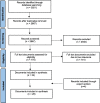What makes a multidisciplinary medication review and deprescribing intervention for older people work well in primary care? A realist review and synthesis
- PMID: 37743469
- PMCID: PMC10519081
- DOI: 10.1186/s12877-023-04256-8
What makes a multidisciplinary medication review and deprescribing intervention for older people work well in primary care? A realist review and synthesis
Abstract
Background: A third of older people take five or more regular medications (polypharmacy). Conducting medication reviews in primary care is key to identify and reduce/ stop inappropriate medications (deprescribing). Recent recommendations for effective deprescribing include shared-decision making and a multidisciplinary approach. Our aim was to understand when, why, and how interventions for medication review and deprescribing in primary care involving multidisciplinary teams (MDTs) work (or do not work) for older people.
Methods: A realist synthesis following the Realist And Meta-narrative Evidence Syntheses: Evolving Standards guidelines was completed. A scoping literature review informed the generation of an initial programme theory. Systematic searches of different databases were conducted, and documents screened for eligibility, with data extracted based on a Context, Mechanisms, Outcome (CMO) configuration to develop further our programme theory. Documents were appraised based on assessments of relevance and rigour. A Stakeholder consultation with 26 primary care health care professionals (HCPs), 10 patients and three informal carers was conducted to test and refine the programme theory. Data synthesis was underpinned by Normalisation Process Theory to identify key mechanisms to enhance the implementation of MDT medication review and deprescribing in primary care.
Findings: A total of 2821 abstracts and 175 full-text documents were assessed for eligibility, with 28 included. Analysis of documents alongside stakeholder consultation outlined 33 CMO configurations categorised under four themes: 1) HCPs roles, responsibilities and relationships; 2) HCPs training and education; 3) the format and process of the medication review 4) involvement and education of patients and informal carers. A number of key mechanisms were identified including clearly defined roles and good communication between MDT members, integration of pharmacists in the team, simulation-based training or team building training, targeting high-risk patients, using deprescribing tools and drawing on expertise of other HCPs (e.g., nurses and frailty practitioners), involving patents and carers in the process, starting with 'quick wins', offering deprescribing as 'drug holidays', and ensuring appropriate and tailored follow-up plans that allow continuity of care and management.
Conclusion: We identified key mechanisms that could inform the design of future interventions and services that successfully embed deprescribing in primary care.
Keywords: Deprescribing; Medicines optimisation; Multidisciplinary team; Older people; Polypharmacy; Primary care; Realist review.
© 2023. The Author(s).
Conflict of interest statement
The authors declare no competing interests.
Figures
References
-
- Tarrant C, Lewis R, Armstrong N. Polypharmacy and continuity of care: medicines optimisation in the era of multidisciplinary teams. BMJ Qual Saf. 2022;0:1–4. - PubMed
Publication types
MeSH terms
Grants and funding
LinkOut - more resources
Full Text Sources



